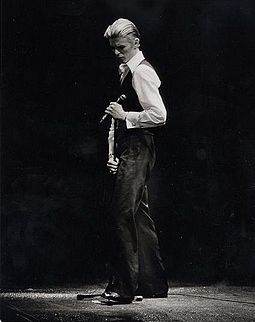Everywhere around me, there are people shaking their head while I gnash my teeth about the loss of David Bowie. From the morning I woke up and saw the news alert to right now, my sky looks very different. I expect it will every day.
I am older now than most of those around me. I am on the tail end of a life that has been filled with ups and downs. Imagine the transitions I have seen – from the staid early sixties and “the perfect family” illusion to the gunslinger seventies and the raised fist 80’s to the disillusioned 90’s and beyond. One of the earliest conversation I remember having about Bowie was at a dinner table while my authoritarian father dictated a laundry list of how awful Ziggy Stardust was.
Ah, but David, as Ziggy, was the first barrier breaker that gave those of us who didn’t fit in a voice – a real voice that was not only a celebration of difference but a call to action.

David Bowie 1970’s Ziggy Stardust period
Remember, “when the kids had killed the man, I had to break up the band.” Bowie never advocated standing still – he had us moving forward, no matter how different, how isolated, how disenfranchised we were. Moving, living, changing, surviving.
“And these children that you spit on as they try to change their world are immune to your consultation – they well aware of what they’re going through. . .” (Changes)
And we did try to change our world and sometimes we did. And sometimes we didn’t. We tried to be heroes – just for one day. And we grew and we changed.
And as we changed, so did David. He showed us that we do not have to be stuck with the first persona upon whom we stumble. By the time he had become the Thin White Duke, I had shed my Diamond Dogs and moved into working within the system. I had not and have not finished my changes, just as David never stopped growing and performing.

Those of you that are behind me – cluttered with punk rock that disappeared without a trace, grunge that shot itself out of existence, rap and hip hop that has alienated you from the majority – your idols did not make it nearly 50 years as a relevant artistic force. They could not change and grow – they burned out, like meteorites passing by a thousand Space Oddities.
Bowie never stopped. He lived a decent life, after he got Ziggy out of his system. He was the Man who Fell to Earth and I was lucky enough to live in the same time frame. He married a supermodel but never boasted. He had children he raised as a father, not a child support machine. He played Live Aid in 1985. He produced a play in his last year of life. He dropped a farewell album two days before his death. He never, ever stopped changing.
Now he has returned to the stardust from which he came and we who loved him are richer for his being. He showed us that we could be different and still make a difference. He showed us that we can change without abandoning our core identity. He showed us that we could be happy and different at the same time. And that we could take arms against our sea of troubles – not just passively sit as they washed over us and erased us from our time.
You may not miss Bowie. You may not understand Bowie. You may think of him as Ziggy for eternity, never realizing that he, like all of us, had the choice to grow and change. He did, and most of us did – and my corner of the universe was richer for Bowie. He was truly a hero.
I hope to see him in the stars when my time comes. I would like the chance to thank him for showing that we all have a place on the Earth and in the stars.
